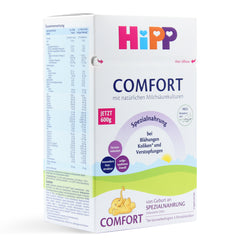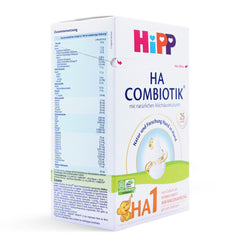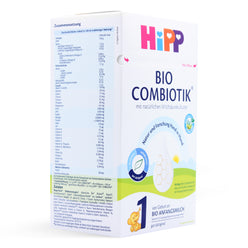What is Metafolin in Formula
41 hours of research 4 minute read

Previously, folic acid was commonly incorporated into infant formulas; Metafolin has largely replaced this. The inclusion of Metafolin in infant formulas has increased over the years due to increasing concerns about the adverse effects of folic acid on babies.
This article explores the formulation of Metafolin, its safety, benefits, and comparison to folic acid.
What is Metafolin?
Metafolin is the calcium salt of the active form of folate known as L-5-methyltetrahydrofolate. Folate is required for the production of DNA and RNA in the body. This makes it an essential component for the cells, as it helps in their growth and division. Having sufficient levels of folate in the body is crucial not only for pregnant mothers but also the newborn babies. In addition, this compound donates one of its carbons for synthesizing phospholipids, neurotransmitters, and myelin in the body. These components help in the neurodevelopment of the baby.
Folic acid is considered the synthetic form of folate and is not naturally in human breast milk. Therefore, it is also not generally found in non-fortified processed foods. On the other hand, human breast milk contains Metafolin naturally. Hence, adding Metafolin to formula milk makes it more like natural breast milk.
Metafolin vs. Folic Acid
While Folic Acid is a synthetic form of Folate, Metafolin is a natural calcium salt of folate, also found in breast milk. Intake of folic acid requires it to be converted to L-5-methyltetrahydrofolate for it to be used by the body. This conversion mainly occurs in the liver; however, not all of it may be converted, and some may enter the circulation as it is. As a result, the infants who take folic acid fortified milk are often found to have a high level of unmetabolized folic acid in their plasma, which on its own may not be of any use to the growing baby.
On the other hand, those infants who take Metafolin fortified milk may easily have it enter the folate processing cycle and be useful for the baby. In addition, using a folic acid-based milk formula is particularly challenging for infants who e unable to convert it to its ready-to-use form due to the limited activity of their developing liver. These babies may benefit from the Metafolin-containing formula, as it does not put additional stress on the developing liver and does not have to do additional work to metabolize it.
Is Metafolin Safe?
The World Health Organization recommends breast milk to be the safest food source for infants for the first six months of their life, after which it may be given in combination with external food sources for up to 2 years. However, breast milk may not be an option for every infant, which is when parents look for the safest formula milk alternative. Even though non-fortified formulas are also available, the fortified formulas offer the additional benefits of providing infants with their required nutrients to help them develop and grow.
Approval By Health Authorities
Every mother prioritizes the safety of their child over everything else. The safety of Metafolin formula milk has been a highly discussed topic in recent years, as more mothers are opting for folate-fortified formulas. Previously, the European Union only approved folic acid to be incorporated into formula milk for better growth and development of infants. However, recently the European Food Safety Authority has also approved Metafolin. This is because of the superior safety levels, effectiveness, and bioavailability of Metafolin found in numerous studies.
What Do The Scientific Studies Say?
One such study further investigated this on infants who were given bioactive forms of folate in order to analyze its effects on their growth and development. The key difference hypothesized between formula and breast milk is that while breast milk-fed infants do not have unmetabolized forms of folic acid in their bodies, the formula milk infant often does. This makes the breast milk-fed infants have a higher availability of folate, while formula-fed infants have to undergo folic acid metabolism. However, the study found that infants fed with Metafolin-containing formula milk have similar folate levels in their bodies compared to the infants fed breast milk.
Metafolin Benefits
Cell Growth and Development
Folate plays a vital role in the development and growth of infants. It is essential for synthesizing new cells and producing genetic materials like DNA and RNA. It is also essential for making new blood cells and the building blocks of proteins known as amino acids.
Healthy Functioning Of The Body Systems
Metafolin is a source of folate, which is required for the body’s healthy functioning and maintenance of the various body systems like the nervous, digestive, and immune systems. Hence a deficiency of folate can lead to several adverse effects in a growing and developing baby. Therefore, consuming Metafolin can most likely prevent that.
Higher Bioavailability
Metafolin is the stable calcium salt of Methyl tetra hydro folate, which acts as an active form of folate in the body. This means, upon its intake, it does not have to go through a series of processes to become available for use - instead, it can directly enter the metabolic process of folate. Therefore, high-quality milk formula brands prefer to incorporate Metafolin into their milk formulas because it shows a higher absorption potential in the body, hence leading to optimum effects. It is also found to have a higher bioavailability as compared to folic acid. In addition, regular consumption of Metafolin can reduce the plasma homocysteine while increasing the folate levels found in the red blood cells and the plasma.
Metafolin Side Effects
The parents should ensure the child is not allergic to methyl folate before choosing a metafolin fortified milk formula. They may consult a pediatrician before changing the milk formula and inform the doctor if their baby has a history of epilepsy, pernicious anemia, vitamin B-12 deficiencies, or other health conditions.
Even though the side effects of Metafolin are rare, if the baby exhibits any signs of an allergic reaction, the parents should immediately seek emergency care. These signs may include shortness of breath, hives, swelling of the lips, throat, tongues, or any part of the face. In case of less severe complications like gassiness and digestive problems, the pediatrician may still be consulted to assess other formula milk that might be better suited for the baby.
Baby Formula With Metafolin
Milk formulas from good brands keep up with the latest research and try to incorporate the constituents that may further benefit the health of the babies consuming them. Some of these include:
✓ Contains Probiotics & Prebiotics
✓ No sugar, no corn syrup, no soy
✓ No starch
✓ HiPP's most popular formula
Check PriceThe most recent expansion into metafolin can be found with one of HiPP’s most popular product lines - HiPP Dutch. Metafolin has started being added to all HiPP Dutch formulas starting mid 2022.
✓ Contains Probiotics & Prebiotics
✓ No sugar or corn syrup
✓ No soy
✓ HiPP's original formula
Check PriceOne example of such formula milk is the HiPP Organic Combiotic formula. This formula milk contains the calcium salt of 5-MTHF, which is the natural form of folate found in human milk. This means it does not require to be converted to its active form, like that seen with folic acid, and can be immediately utilized by the body. In addition, the European Food Authority has also well received the addition of Metafolin after a positive evaluation.
✓ Contains Probiotics & Prebiotics
✓ No sugar, no corn syrup, no soy
✓ Reduced lactose with hydrolyzed milk protein
✓ Easy to digest formula for sensitive babies
Check PriceHiPP Comfort special milk formula may be used by babies of all ages with sensitive digestive systems. It is formulated with metafolin and a reduced lactose content to ensure relief from symptoms of colic, bloating, and constipation.
✓ Contains Probiotics & Prebiotics
✓ No sugar, no corn syrup, no soy
✓ Hydrolyzed milk proteins reduce allergic reactions
✓ Popular for constipated babies
Check PriceThe HiPP HA Combiotic Milk with metafolin is recommended for babies who are at risk for cow milk allergy. This formula not only contains metafolin for proper development and nutrition, but also uses hydrolyzed milk proteins so as to make the formula more digestible for infants with milk allergies.
How to Prepare Formula Milk
Whether it is Folate fortified milk or any other kind of formula milk, preparation is one of the critical factors involved in its effects on the infant. Incorrect preparation methods or prolonged storage time can lead to the introduction of unwanted side effects or the introduction of harmful substances in the baby’s digestive tract. This is why it is important to prepare fresh milk every time before feeding the baby. In addition, the parents should make sure not to refeed any old formula milk and wash the bottle before and after feeding. Most infant formulas recommend the formula be used within three weeks, after which it may lose some beneficial properties.
Most pediatricians and health experts recommend boiling fresh drinking water correctly. After a thorough boil, the water should be left to cool to at least 40 to 50 degrees Celcius. Next, the required quantity of water should be measured and poured into the feeding bottle. The formula milk powder should not be directly added to the bottle based on estimation; instead, the parents should fill it up in a measuring cup and remove any excess. After carefully measuring the required amount of formula milk, it should be added to the water, and the bottle should be closed with the washed cap. This should be followed by shaking the bottle several times and ensuring the milk is at room temperature before feeding it to the baby.
Metafolin
The difference between the available forms of folate in formula milk can seem overwhelming at one glance. However, it is up to the patient to educate themselves and seek pediatrician guidance to make the right choice. While folate is the natural form of Vitamin B 12 found in breast milk, it may be available in two other forms: Folic Acid and Metafolin. Folic acid is the synthetic form of folate, while Metafolin is considered the natural form with higher bioavailability. The higher safety profile and bioavailability of Metafolin have made it a highly popular component of newer infant formulas.
Furthermore, folic acid must be converted to folate in the liver before the body can use it, and many infants are not developed enough to carry out this process efficiently. This lead to high levels of unmetabolized folic acid in their body and adverse effects on their overall development and health. Metafolin fortified milk formulas are readily available in the market and ensure there is no additional stress on the baby’s liver.
When picking the right baby formula, understanding the differences between metafolin vs folic acid is key. Making sure turning folate into usuable form efficiently in the baby's liver is also important. This makes folate as metafolin a good choice for the baby's growth without causing extra stress on the liver. Parents should get advice from their child's doctor and be informed about these options to prioritize their child's health.















Blair -
I have always been taking folic acid since it aided in the development of my baby when he was still in my belly. It was surprising to know that there is also a natural form of folic acid that will best suit my baby’s needs. Glad to hear about Metafolin and its benefits. Now I know how to choose a baby formula. As simple as folic or metafolin can make a difference in the child’s development.
Shana M -
It’s amazing how a small change like switching to Metafolin can make such a big difference in a baby’s comfort and digestion. I also wish more parents knew about it earlier—it could save them a lot of stress and sleepless nights. It’s great to hear that so many families have had a positive experience with Metafolin-based formulas. Hopefully, more awareness spreads so parents can make the best choice for their little ones!
Jorge -
I tried a formula similar to one with folic acid, but my experience was totally different because my baby had trouble digesting synthetic folic acid and became fussier. That’s why I found Metafolin so interesting—it’s a more natural form of folate that some babies tolerate much better. I wish I had known about it sooner. Many parents have shared that switching to formulas with Metafolin made a noticeable difference for their little ones.